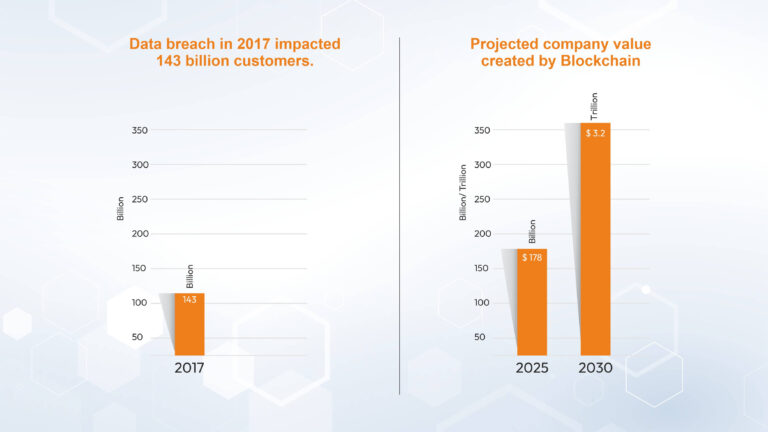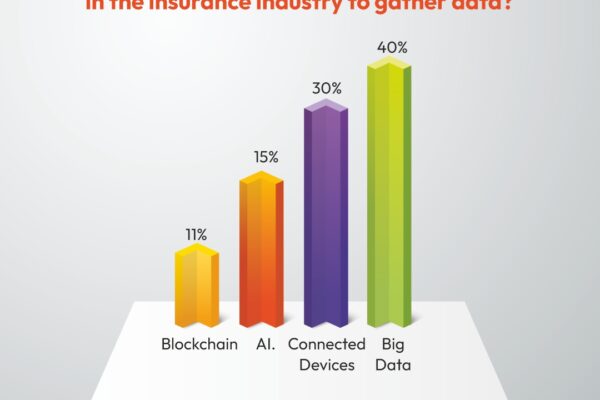The use of blockchain technology is spreading throughout the information technology industry. The majority of people are aware with well-known blockchain currencies (often referred to as cryptocurrencies), including Bitcoin and Ethereum. But blockchain is now much more than just a platform for online payments.A centralised management body, like a bank, is not required thanks to the distributed peer-to-peer ledger technology known as blockchain. The system is simply a chained-together log of transactions made up of data blocks. An unparalleled level of transparency is made possible by its open-source, impermeable configuration. Each record is dispersed to millions of computers throughout the globe, where its correctness is checked.
Blockchain: A boon for privacy and security
Cyberattacks is one of the biggest threats in present digital world. When Equifax revealed its massive data breach in 2017 that affected 143 billion customers, look what happened to our data: we went haywire. Such nightmares can be put to a stop by blockchain technology. It can protect our data from alteration and illegal access.
Blockchain is the best technology for areas requiring great security since it is a decentralised system. As a result, there is NO SINGLE POINT OF ENTRY for a large-scale assault since all the data held on a bitcoin or other blockchain network is authenticated and encrypted using a cryptographic algorithm. Blockchain also makes it simple to detect harmful data assaults because of peer-to-peer links, which prevent data from being changed or tampered with.
If you ordered food, had it delivered, and later discovered it to be repulsive, you could use blockchain technology to track every stage of the supply chain. The owner of the business from which you made the transaction might review his blockchain record in the past and determine where exactly in the supply chain the order went wrong, displeasing you. He may start with the farmer and work his way up to the producer, distributor, retailer, and finally you, the consumer. In other words, blockchain in supply chain management offers ongoing validation and transparency of shared transactions amongst several supply chain stakeholders. Because all transactions are irreversible and verifiable, it is simple for an owner or client to inspect each record.
Let’s be honest. The preservation of people’s health information nowadays is fraught with several issues. Because everything is stored in centralised files, anyone may access this extremely sensitive data. It can take hours to find the correct file when someone asks someone else for someone else’s information; this creates potential for data breaches, theft, or other losses. Blockchain technology is crucial in this sector for this reason.
Here, blockchain technology does away with the requirement for a centralised authority and allows for quick access to data. In this case, it is challenging for a hacker to alter the data since each block is interconnected with every other block and dispersed among the blockchain nodes. Privately maintaining individual medical file information is of the highest importance, hence blockchain technology
For a variety of reasons, it is conceivable that governments will eventually switch from fiat money to cryptocurrencies. The settlement times are shorter, and cryptocurrency is generally more efficient.Like conventional money, cryptocurrencies may also be backed by physical assets, and different controls can be used to affect their price. This is similar to the method of increasing the money supply to decrease the value of a dollar. For instance, Zimbabwe is preparing to develop its own national digital currency and has already started utilising Bitcoin as a hedge against its own currency.
Blockchain technology is going to revolutionise business, government, and personal life in the next years, and every blockchain development firm wants a piece of the action. An analysis claims that blockchain technology will be the foundation of new, creative firms, and that the value of organisations developed utilising this cutting-edge technology will be in the billions of dollars. According to forecasts, blockchain will create company value of over $178 billion by 2025, and $3.2 trillion by 2030. These figures demonstrate the enormous potential of blockchain technology in India.
To verify our identity online, we now utilise passwords and authentication questions. With a safe, secure, and simple-to-manage digital identity, blockchain could be able to replace this system.
Your digital identity is based on the specifically random set of numbers issued to each user on a blockchain network, as opposed to demonstrating who you are by recalling some personal, arbitrary piece of information that may perhaps be guessed or stolen.This makes it far more dependable than our present system because your identity cannot be compromised or modified without having access to your private key.
Blockchain: Addressing the Challenges
The use of blockchain technology is fraught with difficulties in addition to its numerous advantages. The scalability of implementation has been highlighted as the main obstacle, since the present processing speed of transactions fluctuates owing to the fact that it depends on several variables. The performance and scalability of blockchain networks will be the main areas of attention. Although blockchain development groups will continue to make regular efforts for building new products and models which will maintain enhancing the security of data and transactions, security will remain one of the key issues, as it is with other comparable revolutionary technologies. Interoperability, which is still in its early stages in the nation and has a lot of room for development, is another area of worry.
Currently, trading between nations is discouraged since it is an ineffective and disorganised process that slows down business. International trade is likewise rife with faults, dishonesty, and counterfeiting.Adding bitcoin to the mix will solve a lot of these issues. Much of the fraud and inefficiencies may be addressed by combining payment methods, documentation, and regulation through a single digital international system. This will usher in a new age marked by increased trade and improved inter-national relations.
Blockchain: A new dawn awaiting
We are witnessing greater advancements as blockchain technology continues to develop and grow, not only in cryptocurrencies but also in a number of commercial applications including smart contracts, automated tracking, and rule enforcement.
Promoters and publishers struggle because of the bad players because of the difficulties with digital advertising, such as bot traffic, a lack of transparency, domain fraud, ineffective payment structures, etc. Blockchain has been discovered to help supply chain problems by being transparent and dependable. By using this technology, advertising-related transactions may be handled more effectively.
At each stage of the supply chain, the usage of blockchain can monitor employment, expenses, and releases while minimising time delays and human mistakes. Blockchain can also guarantee the legality of items and the fair trade status of those products through traceability. Blockchain has the ability to stop income losses from illegal or grey market goods as well as reputational harm.
Statistics show that over 1.5 billion individuals in underdeveloped countries lack suitable ways to establish their identification. Disenfranchised people will have access to legal records and the associated rights thanks to a worldwide blockchain identification platform.
As you can see, blockchain technology has a lot of promise and is continually developing. Additionally, blockchain technology has a promising future, and it appears that the best is yet to come when you take into account the fact that it has already shown potential in practically every field.
It will be intriguing to watch what the future of blockchain technology holds, particularly in terms of payments, banking, decentralised markets, and other things. We hope these examples of how blockchain technology could change the world in the future were interesting to you.


